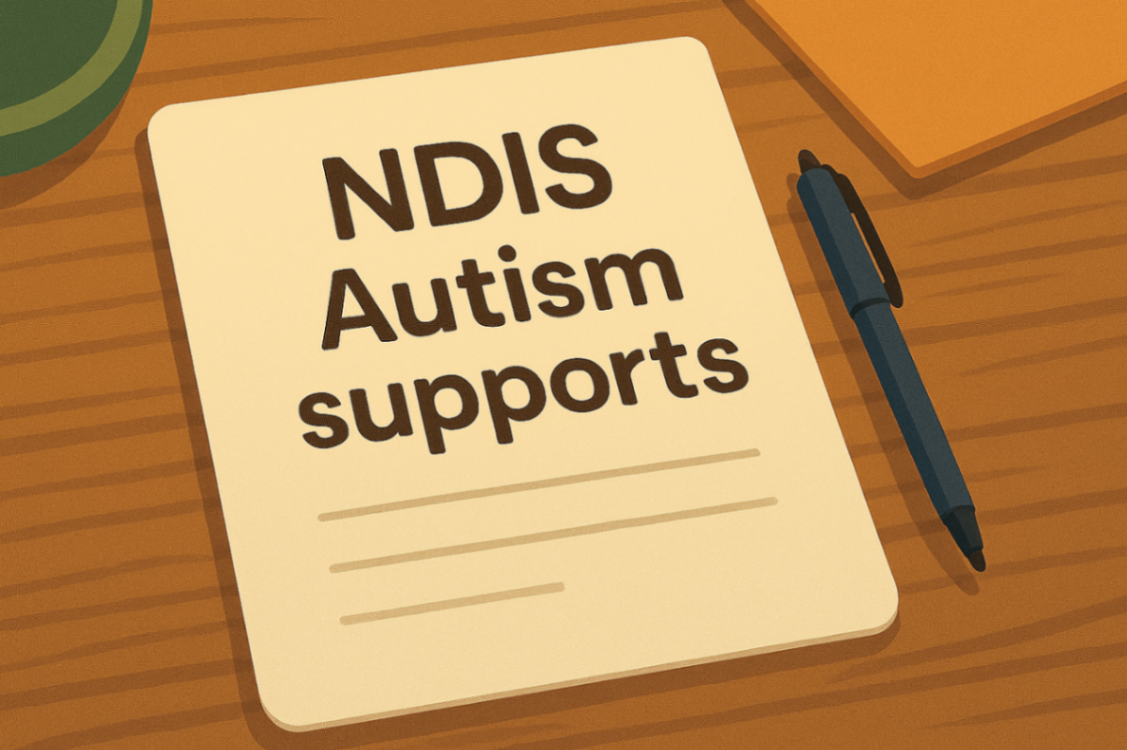
ndis autism supports: what’s funded and how to access them
16 July, 2025
Introduction
Accessing the right NDIS autism supports can feel overwhelming for parents — especially with so many options and funding categories to consider. The good news is, the NDIS continues to fund a wide range of autism-related therapies and supports to help children reach their goals. In this guide, we’ll explain what’s funded, how to access it, and how daar can help families make the most of their plan.
Key Highlights
-
The NDIS (National Disability Insurance Scheme) provides tailored support to individuals with Autism Spectrum Disorder (ASD), addressing unique challenges and developmental goals.
-
Eligibility depends on factors such as your child’s autism diagnosis and submission of the Access Request Form.
-
Supports include early intervention, capacity building, and assistance in daily activities to empower both children and their families.
-
NDIS funding for autism varies based on the level of autism diagnosis, with services provided by NDIS-registered service providers.
-
Parents can access help with NDIS behaviour support for autism, therapy, and inclusive community participation.
-
Choosing the right NDIS autism support provider and understanding your role is crucial for building long-term capacity for your child.
What Is NDIS Autism Support and Who Is It For?
 When your child is diagnosed with autism, navigating support options can feel overwhelming. The NDIS autism support stream is designed for individuals whose daily living is significantly impacted by ASD.
When your child is diagnosed with autism, navigating support options can feel overwhelming. The NDIS autism support stream is designed for individuals whose daily living is significantly impacted by ASD.
To be eligible, families must submit an access request form with supporting documentation. Children under 9 may access the scheme through the early childhood early intervention (ECEI) approach, even without a confirmed autism diagnosis. This ensures timely, flexible supports that respond to developmental needs.
How the NDIS Supports Children with Autism and Their Families
The NDIS funds therapy services, developmental programs, and inclusive community participation. These services improve independence and quality of life for children with ASD. Supports may include help with social communication, emotional regulation, sensory processing, and more.
Importantly, families receive training, respite, and coordination assistance that builds their confidence and capacity to care. With the help of an autism support worker or therapist, children can build new skills and thrive in everyday environments.
NDIS Behaviour Support for Autism: How It Works
Many children with ASD often benefit from tailored NDIS behaviour support. With help from psychologists and behaviour practitioners, families can identify triggers, reduce harmful behaviours, and promote positive alternatives. These supports are delivered through a behaviour support plan, often funded under capacity building. The goal is to enhance safety, emotional regulation, and participation in daily routines at home, school, and in the community.
Support services like behaviour support are here to lower risks, build stronger feelings, and help reach new steps. These plans are made so your child can fit better into daily life and become more independent. Thanks to NDIS funding, these support services are easy to get and make a big difference for people with ASD and their families.
How to Access NDIS Autism Supports
Getting NDIS autism supports starts with understanding your plan and the categories where funding is available.
-
Check your NDIS plan categories – Most therapy supports sit under Capacity Building or Improved Daily Living.
-
Choose the right provider – Select a registered NDIS provider like daar, who can deliver therapy aligned with your goals.
-
Book your assessment or consultation – A functional assessment or therapy intake helps identify your child’s needs.
-
Start your sessions – Therapy can be delivered in-clinic, at school, or through mobile and telehealth options.
Tip: Keep records of progress and updates — they help ensure continued funding at your next NDIS review.
NDIS for Autism: What’s Covered Under Your Plan?
 An NDIS plan gives money for supports that are seen as needed so people with autism can reach their own goals. Core funding is there to help with things you need every day. This can be help to move around or items that help you learn. Capacity-building support helps build skills for the future.
An NDIS plan gives money for supports that are seen as needed so people with autism can reach their own goals. Core funding is there to help with things you need every day. This can be help to move around or items that help you learn. Capacity-building support helps build skills for the future.
Your ndis plan might have therapies like speech or help with doing things at home and in daily life. There can be things like new technology or chances for your child to join in with others in the community. The plan is made using necessary supports to fit your child's needs. This funding is made to give your family choices so you can use it on what helps your child learn and grow the most. When you know what is included, your family can make the most out of the ndis resources.
Levels of Autism and Their Impact on Funding
Autism is classified into three levels by the DSM-5, which directly impacts NDIS funding eligibility and allocation.
|
ASD Level |
Description |
|---|---|
|
Level 1 |
Requires support. Difficulties in social interaction, planning, and organisational skills. |
|
Level 2 |
Requires substantial support. Limited communication and repetitive behaviours. |
|
Level 3 |
Requires very substantial support. Greater severity of challenges, with profound assistance needed daily. |
For children diagnosed with Level 2 or 3, funding is automatically considered based on a substantial need for intervention. However, for Level 1, evidence must demonstrate how developmental delay impacts tasks like communication or mobility. Comprehensive documentation ensures funding is aligned with appropriate care.
Understanding NDIS Funding for Autism: Key Inclusions and Exclusions
When you use NDIS funding, it is important to know what the plan will and will not pay for. Support you can get with this funding includes early childhood intervention, capacity building funding, different therapies, changes needed at home, and help to take part in the community.
The plan does not cover things like your usual daily expenses, help that the government already pays for, or services that could be unsafe. If you keep up with NDIS legislation, you can use the funds so they are in line with your child’s goals. This makes it easier for people to get needed resources without trouble from rules or paperwork. The right knowledge helps you get the most from your ndis support and gives the best help to your child.
Capacity Building and Social Participation Supports
Supports that come under capacity building help autistic children grow their independence and connect better with people. Some examples are therapies helping with self-awareness, joining economic participation programs, and doing things that build social communication.
-
Funding to pay for therapies that make talking and understanding feelings easier.
-
Training for parents and carers so they can better help autistic people with tough moments.
-
Using technology in education to help learning go well.
-
More chances for outdoor activities so children get involved in the community.
Using these supports lets children take part in more places. This happens both at school and in public spaces for fun. This way, their growth covers all areas. The NDIS focuses on capacity building. This makes a strong base so they can have more freedom in the future.
Common Challenges Parents Face With NDIS Autism Plans

-
Difficulty articulating needs during planning meetings
-
Uncertainty around NDIS autism support inclusions
-
Confusion with documentation and eligibility
-
Delays in provider onboarding or plan activation
Having an experienced plan manager or support coordinator can relieve much of the administrative burden and help families advocate for appropriate supports.
Choosing the Right NDIS Autism Provider for Your Family
Finding a provider who aligns with your child’s goals and communication style is essential. Use the NDIS Provider Finder tool to locate registered professionals in Liverpool, Casula, Prestons, Moorebank, and surrounding suburbs.
An ideal autism support worker or therapist will:
-
Specialise in ASD and developmental delays
-
Offer flexible delivery (home, clinic, telehealth)
-
Involve families in planning and reviews
How daar Helps Families Navigate NDIS for Autism
At daar, we walk with families every step of the way. From submitting access requests to building individualised behaviour support plans, we provide:
-
NDIS plan coordination and reviews
-
In-house therapists and support workers
-
Guidance on navigating funding changes
-
Services available across Liverpool and nearby suburbs
Conclusion
Understanding how to access and use your NDIS autism support funding allows you to plan ahead and advocate for your child’s growth. Whether it's therapy, family training, or finding the right behaviour support plan examples, knowing what’s available ensures you’re not missing key opportunities. Remember, every child deserves the chance to thrive—and with the right NDIS supports in place, your child can reach their full potential.
Need personalised help with your NDIS autism support journey? daar's experienced team in Liverpool can guide you through eligibility, access, funding, and therapy coordination. Whether you're seeking an autism support worker, planning your child’s next steps, or adjusting your NDIS behaviour support for autism, we’re here to help.
Book your consultation today to start building meaningful outcomes for your child’s future.
Frequently Asked Questions
Can my child get NDIS funding if they have a recent autism diagnosis?
Yes, children who have had a recent autism diagnosis can get NDIS funding. They need to meet the NDIS eligibility rules. This means they must show they have a permanent disability and show how it affects their daily life. You also need to give proof to the NDIS so the child can become an NDIS participant.
What evidence do I need to provide for NDIS autism supports?
Parents need to show proof from health professionals, like a paediatrician or a clinical psychologist, along with the guidelines from the statistical manual of mental disorders for ASD. Extra information from referrals can help show how autism affects daily life. This can also help with being eligible for ndis supports.
Are early intervention services covered under NDIS?
Yes, the NDIS covers early childhood intervention supports. These early intervention programs are meant for children who have developmental delays or disabilities. They help in the important stages when kids grow and learn. With early childhood intervention supports on their NDIS plans, families can get help for therapy and daily activities. This also helps the children to improve in other ways as well.
How can I change my funded supports if my child’s needs change?
If your child’s support needs change, you can ask for changes during an NDIS planning meeting. Let the NDIA know so they can look at the NDIS plan and move funding to new priorities. A plan manager can help make these changes smooth and easy.
What should I do if my NDIS application is rejected?
If your access request is denied, check if you meet the eligibility rules and have the right documents for your residency. This might include having a protected special category visa. You can appeal under the ndis legislation and an LAC can help you with this. If you still do not get the result you want, you can take the ndis matter to the Administrative Appeals Tribunal for more help.
.svg)

















